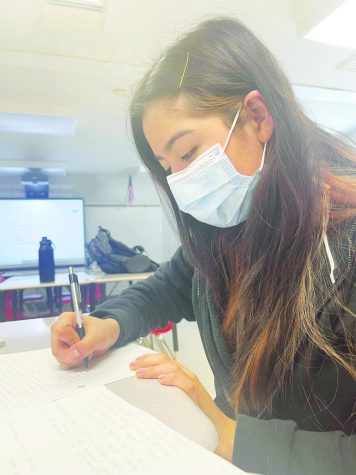Unblurred Lines: VHSL ruling defines transgender
In a unanimous ruling by the Virginia High School Leauge (VHSL) certain transgender athletes will be allowed to participate in high school sports.
Transgender athletes are now allowed to participate in the sport pertaining to their birth gender, unless the student has gone through sex reassignment surgery before puberty, or after puberty and have had surgical atatomical changes, including genitilia, and must be taking or have taken hormonal therapy.
“In regards to gay rights, people are becoming more understanding of them and they are not as judgemental about it. Now it’s become much more normal,” senior boys lacrosse player Zakell Samere said. “I don’t think this will affect the dynamic of high school sports that much, but if a guy were to switch and play women’s sports he would probably play really well.”
With 18 states that already have a similar policy in place, the state of California allows transgender students to play mens or womens sports, depending on gender whichever they prefer to identify themselves.
Human Rights Campaign Representative Johanna Eager believes believes that while transgender youth have gained respect and equality over the past decade, this new law in a step in the wrong direction.
“The new policy makes it almost impossible for a transgender student to actually play. There’s nothing fair in that,” Eager said. “I can’t speak for the VHSL but I can say that transgender youth deserve the same opportunities as their peers, including athletics.”
Just as women’s rights in athletics have become increasingly tolerated through the initiation of Title IX (a law allowing women to participate in high school athletics), gay rights have also become much more accepted in modern society.
“I like the fact that they are making it okay for you to play the sport if you get the surgery, making it socially acceptable for you to play the sport,” senior girls lacrosse player Lailumah Faisal said. “But the thing I don’t like about it is if you can’t afford to go through the surgery, but you still consider yourself a boy and you want to play that men’s sport, you can’t. I feel like that’s them [the VHSL] denying you as who you are. They aren’t respecting the decision you’re making of who you want to be.”
Boys Varsity Lacrosse coach Bill Maglisceau was initially unaware of VHSL’s new ruling, but he believes that the outcome of such a law all depends on the attitudes of coaches and players.
“I think the coaches are very open about anyone playing sports. It depends on the player’s attitudes,” Maglisceau said. “ The team should have spirit and coaches love a person who puts their teammates first.”
Maglisceau also believes that this new ruling will have little to no affect on AHS sports.
Director of Student Activities Karl Kerns understands the immediate impact of the rule on AHS sports.
“Right now, if someone asked to try out [for a sport] we can’t deny them, because there’s a VHSL rule allowing it,” Kerns said. “There will also be standards we will have to abide by.”
According to VHSL Executive director Ken Tilley, members of the VHSL felt that the ruling has “psychological standards” and felt that “would fit best” and were “most comfortable with that position.”
Although VHSL Spokesman Mike McCall admits a transgender student hasn’t yet come forward, the VHSL does not want to be “reactionary” and members are working to create a policy that provides “safe and equitable competition” for all student-athletes.
“It will happen at some point — it’s a matter of when,” McCall said. “We need to stay ahead of this before it drops on our door.”
While McCall and the VHSL believe the new ruling will better high school athletics, Eliza Byard, the executive director of the national Gay, Lesbian and Straight Education Network, believes the opposite.
“This is overly restrictive,” Byard said. “It’s very important that transgender students have access to school activities. But if the idea was to increase participation, this won’t do it.”
Girls Varsity Basketball coach Patrick Hughes is also apprehensive to the new ruling.
“I think it’s going to be very confusing and it could be with anything like that. It’ll be a difficult policy,” Hughes said. “Hopefully it’ll be positive and people will be more tolerant. I just hope for awareness and a better understanding.”
In contrast to the new VHSL Ruling, the NCAA policy, which governs participation in most college sports, does not include a requirement for formal sex reassignment.
Executive Director of ROSMY, a Richmond-based group that works with sexual minority youth, Beth Panilaitis, believes that this policy should be the template for the VHSL as it is much less restricting on student-athletes who identify as transgender. Despite limitations, though, she is satisfied that the VHSL has taken action.
“The first thing I’d say is, I’m very pleased to have the Virginia High School League being proactive about this,” Panilaitis said. “It’s understanding (that) there are transgender students in Virginia schools and understanding that (there) are transgender athletes.”
With a 27-0 vote from the VHSL executive committee, the new policy will govern participation at the state’s 313 public high schools starting next school year.

This is Destiny’s fourth year on the The A-Blast staff, starting as a staff writer her freshman year and later becoming an International editor her sophomore...













